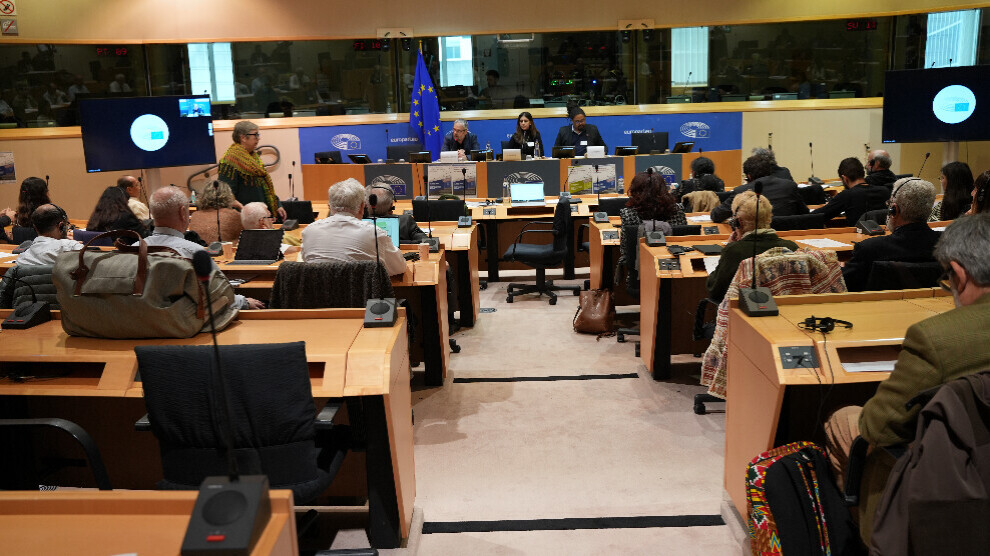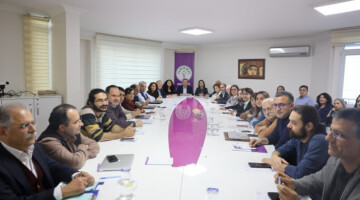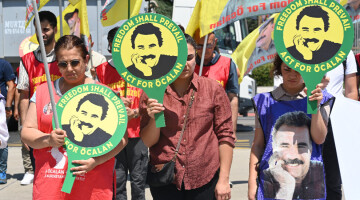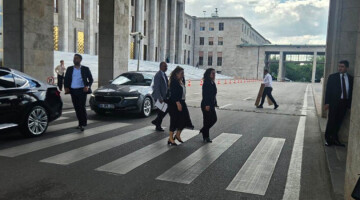A conference on the situation of political prisoners subjected to isolation, torture and ill-treatment is taking place in the European Parliament (EP).
Titled "Political Prisoners: Isolation, ill-treatment and torture”, the conference was organized jointly by the European Lawyers for Democracy and Human Rights (ELDH), European Democratic Lawyers (AED) and the Association for Democracy and International Law (MAF-DAD).
The conference, hosted by Massimiliano Smeriglio, Member of the European Parliament, included several sessions.
786 political prisoners in the Philippines
One of the keynote speakers, Philippine Edre Olalia, interim deputy of the International Association of Democratic Lawyers and President of the National Association of People's Lawyers, drew attention to the situation of political prisoners in the Philippines and said, "Almost 40 years later, there are still 786 political prisoners."
"We must work for the release of political prisoners," Olalia said, asking the international community to scrutinise, if not impose military sanctions on the government in the Philippines. "The existence of political prisoners is proof that governments have failed," Olalia said, adding that peace negotiations should be initiated and the situation of prisoners should be addressed in this context.
Universal law suspended in Imralı
Dr Gülşah Kurt, an expert on criminal law and human rights law and member of Academics for Peace, was among the keynote speakers. Dr Gülşah Kurt discussed the situation of political prisoners in Turkey and especially the situation of Kurdish People's Leader Abdullah Öcalan. Gülşah Kurt spoke about the increase in the number of F-type prisons in the last twenty years and stated that the conditions in İmralı Island Prison, where Öcalan has been held since 1999, are beyond F-type prisons. Kurt pointed out that the right to hope is not applied to Abdullah Öcalan and drew attention to the arbitrary disciplinary penalties and the barriers to family and lawyer visits. Kurt criticised the fact that states turn a blind eye to these violations and said: "We are talking about a situation where universal principles are suspended and human dignity is disregarded". She stated that there is no point in recognising these principles if even the minimum standards for prisoners are not respected and underlined the need to develop minimum rules for prisoners.
The case of Ilaria Salis
Following the opening speeches, the first panel focused on examples from Europe. In the panel moderated by Helene Debaty, President of the Lawyers' Union for Democracy, Aurora D'agostino, Co-President of the Italian Democratic Lawyers' Association (GD), spoke on "The Case of Ilaria Salis in Hungary and Prison Conditions". Aurora D'agostino said: "Ilaria Salis is an Italian citizen. She was arrested in Hungary. She has been in prison for 11 months.” Aurora D'agostino stated that the arrest and conditions of Salis were learnt too late and criticised the press for turning a hand to the issue too late.
80 Basque political prisoners in Spain
Bego Atxa, the representative of 'Sare herritarra' from the Basque region, evaluated the situation of Basque political prisoners. Stating that human rights are for everyone, Bego Atxa said: "Although ETA has given up the armed struggle, there are still around 80 political prisoners, and 23 of them are women. 7 of them are held in prisons thousands of kilometres away from their families."
Human rights regress, justice is politicised in Europe
Prof. Louis Lemkow, ERC representative from Catalonia, emphasised that "there is a regression in Europe in terms of human rights". Pointing out that the situation has worsened with the wars in Gaza and Ukraine, Lemkow said, "There is an erosion of rights. Justice has been politicised. In Spain, politics overstepped its boundaries and took over the judiciary. We call this the politicisation of justice."
Imrali is a laboratory
The second panel was entitled "Turkey and Imrali Prison". The moderator, Deepa Driver, Co-President of the Haldane Socialist Lawyers Association, stated that the number of prisoners in Turkish prisons has increased fivefold, and that Turkey ranks second after Russia among OSCE members in this respect. "We should treat İmralı as a laboratory," Driver said.
Imrali isolation is unprecedented
Lawyer Lena Charlotta Lagnander, the representative of the International İmralı Delegation, made a presentation on the "findings of the delegation". Highlighting the multidimensional oppression of the Kurdish people, Lagnander said, "This current isolation is unprecedented in the world.”
Speaking about the struggle of the Peace Mothers, Lena Charlotta Lagnander drew attention to the oppression of Kurdish women, saying, "They are not talking about unconditional peace. We met with them. They talked about their lives. It was a very powerful meeting. They gave us a message. They told us to tell the world what happened to them.” Lagnander talked about the pressures, arrests and threats the Peace Mothers have long been subjected to, and defined the situation of Kurdish People's Leader Abdullah Öcalan as "completely unlawful".
Isolation must be lifted
Lena Charlotta Lagnander stated that lawyer and family meetings were prevented, isolation was widespread in prisons and even speaking Kurdish was "not allowed". Lagnander stated that even those who are released from prison are charged for food in prison and that health conditions are not humane. "Isolation is torture for everyone,” Lagnander said, adding: "We should also come together and talk, but we should take a decision and take steps. Democracy is under threat. Organisations like the CPT are very fragile. They have prepared a report but have not released it. We should put pressure on them to release the report. European countries should also put pressure on Turkey. With their silence, they approve what Turkey is doing. Isolation must end. Isolation must be abolished in all countries. The Kurdish people are an example for us with their honour and resistance."
Mazlum Dinç, a lawyer for the Istanbul-based Asrin Law Office that represents Abdullah Öcalan and his fellow prisoners in Imrali, spoke about "The situation in İmralı Prison and the Right to Hope" and stated that prisons and torture are used as a means of oppression in Turkey. Describing the torture suffered by prisoners and the pressures suffered by their families, Mazlum Dinç stated that great resistance was organised against this with hunger strikes and actions of self-sacrifice.
Repression and isolation in Turkish prisons
Mazlum Dinç stated that torture is systematically continued with different methods in order to liquidate the Kurdish Freedom Struggle and added, "Even for social media posts, sentences of up to four years are given.” Dinç stated that ordinary prisoners are not even put in prison in the case of receiving heavy sentences such as 8-10 years, while a completely different situation is experienced in the cases of political prisoners, who are put in prisons a thousand kilometres away from their families and see the rights they obtain through resistance taken away from them.
Mazlum Dinç stated that access to health care is not possible either: “Even seriously ill prisoners are treated late and inadequately, and political prisoners are deliberately taken to death. All basic needs in prisons are forcibly met by political prisoners. Depositing money from outside to prisoners financially straitened is considered as a crime and those who do this are treated and punished as members of an illegal organisation.”
Drawing attention to the fact that prisoners who have served their sentence are not released on arbitrary grounds, Mazlum Dinç said, "There is also an İmralı dimension to the aggravation of the violations in these prisons," adding that a prohibited isolation and torture system was built in İmralı in 1999. Dinç said, "A torture system was built in which none of the rules of international law apply. Although we did not have any expectations of domestic law, we still made applications. We also made applications internationally. The ECHR has already acknowledged the fact that there was no fair trial. It was also decided that a life sentence is against human rights. The Right to Hope is not applied and there is no pressure on Turkey in this regard.
An international network against isolation should be established
Dinç said that although the UN has taken a precautionary decision, meetings with lawyers continue to be prevented and added: "International organisations are acting too late regarding Abdullah Öcalan and Kurdish political prisoners, and even when they take decisions, they do not stand behind them.”
Mazlum Dinç said that a more active struggle should be waged against the İmralı isolation, adding: "This is not only a problem for the Kurds. It is a fundamental problem for all humanity.”
Dinç stated that powerful non-governmental organisations also ignore the issue of İmralı, citing the silence of Amnesty International as an example. He remarked that an international network should be established to fight to break the isolation. Dinç especially asked international bar associations to get involved.













